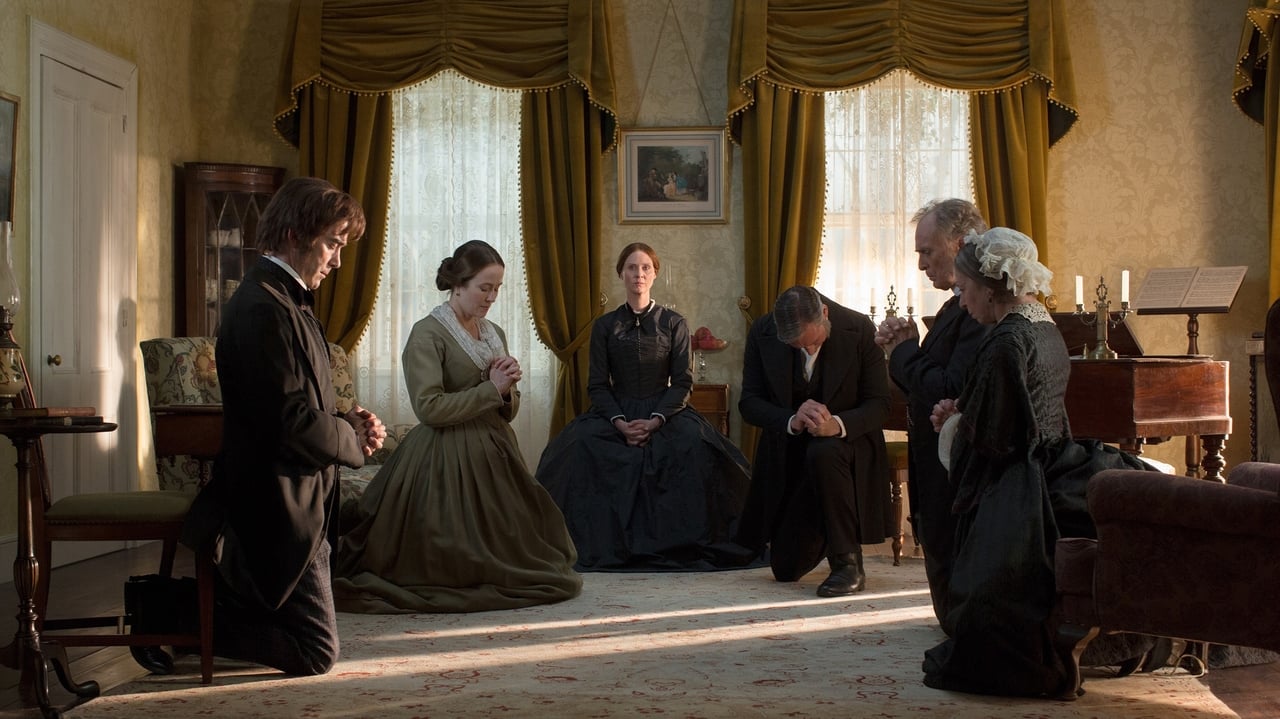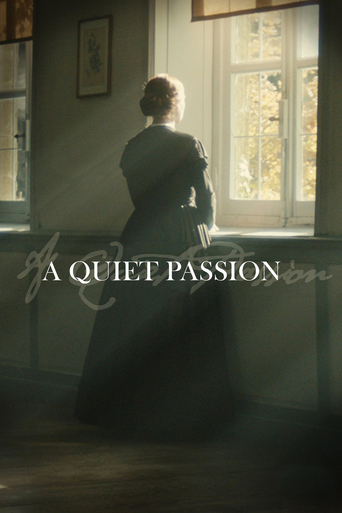Comwayon
A Disappointing Continuation
GarnettTeenage
The film was still a fun one that will make you laugh and have you leaving the theater feeling like you just stole something valuable and got away with it.
Billie Morin
This movie feels like it was made purely to piss off people who want good shows
Sarita Rafferty
There are moments that feel comical, some horrific, and some downright inspiring but the tonal shifts hardly matter as the end results come to a film that's perfect for this time.
proud_luddite
He life and poetry of Emily Dickinson (1830 - 1886) is the subject of this biopic, portraying an early feminist who lived life on her own terms within limited situations while facing sadness and despair in her later years. Dickinson was from a prominent family (her father was a lawyer) and lived in Amherst, Massachusetts.Writer/director Terence Davies deserves so much credit for this fine film. The first half is blessed with sharp and witty dialogue using language and repartee in a style that is rarely used in today's America. Similarly, Davies' directing style is as poetic as Dickinson's writings which are frequently recited in the background. Even when poetry is not recited, there is a poetic mood that stays throughout the film especially in the second half when the lightness of the early years have passed.For the most part, the acting is good especially Cynthia Nixon as the adult version of Dickinson. Nixon is especially strong in the later years of despair and illness. But there are moments the actors seem ill at ease with a language that no longer exists in contemporary America. Catherine Bailey portrays a very sharp-witted, independent-minded friend of Emily and her sister. While Bailey is good in the role, some extra pizzazz could have made her a scene-stealer.The second half is quite serious at it deals with illness, dying, and the despair of living a life that is perceived as only partly lived. One particularly moving scene involved Emily brushing off the kind attention of a sincere, handsome suitor. By the end of this scene, it was easy to feel empathy and sadness for everyone involved."A Quiet Passion" was like the experience of visiting a historical home that is open to the public where ropes separate visitors from the rooms. But in this case, the ropes are temporarily removed and we are allowed in as long as we keep a respectful distance. With a fine cast as well as superb lighting, costumes, and set designs, Davies does a great job in recreating a time and place long gone. Viewing this film is a very soulful experience.
dpo-19471
For a person who had such a dynamic inner life, "A Quiet Passion" certainly makes Emily Dickinson's existence seem dull as nails. The film moves at a snail's pace for far longer than necessary. I had to take breaks from watching it out of sheer tedium. Dark interiors and agonizingly slow scenes capture the outward appearance of a person whose 1,800 poems and thousands of letters reveal a far more humorous, spiritual, and animated individual.That Dickinson was unknown to the outside world during her own time is not surprising, given her introversion. That a contemporary biographical film of her life wasted so much time confirming that perspective, and so little time capturing her incredible genius, is a disappointment.Don't waste time and energy watching this film; read her poetry, her letters, and biographies for insight into this unique poet. Once freed from societal constraints and rules to produce "acceptable" poetry; Dickinson created with words a prism into her complex perspective of nature, life, death and God.
jamesbigham
This movie is way to slow, and does not contain enough substance for a two hour film. The opera scene was way to long without enough script to justify it being there at all. The actor simply say their lines with little or no emotion, and there is really no point, they just walk around the garden or the camera pans the room while nobody talks. I only made it through the first 40 minutes before being bored to tears so I cant fully judge this movie. however; from what I DID see I would never recommend this film.
The_late_Buddy_Ryan
Terence Davies, a director who specializes in period settings, dimly lit interiors and intimate family dramas, seems like the perfect match for his protagonist here, who rarely left the grounds of her family home (the location for the film's exterior scenes) and was known to her Amherst neighbors as "The Myth." Davies has said that Cynthia Nixon was originally cast because of her physical resemblance to the pale, red-haired poet, though her amazing subtlety as an actress and her sharp intelligence can't have done any harm. To the evident dismay of her fans (see earlier reviews, passim), instead of the sharp-eyed nature poet or the gentle, self-mocking social satirist, Davies gives us Emily the existentialist---uncompromising, irreverent, no fan of Longfellow ("gruel!"), suspicious of the clergy (or even of the Deity Himself), preoccupied with death, bereavement and "eternity." Dickinson mavens will no doubt object to the additions and subtractions in Davies's script. There's lots of Vryling Buffham---except for the foofy name, an invented character who helps young Emily and her sister Vinnie (Jennifer Ehle) fill their days with brittle, "superficial" chatter--not so much of Thomas Wentworth Higginson and other significant figures in her life. A more serious problem, IMHO, is that Davies's dialogue sounds pretty stagy in these early scenes, like a mashup of Jane Austen and Oscar Wilde, and even old pros like Nixon and Ehle can seem uncomfortable with their lines. As Emily's adult personality becomes more sharply defined, though, and her craving for solitude and certainty more intense, Davies is entirely in his element, and the second half of the film is totally involving.Keith Carradine is a good left-field casting choice for the whiskery paterfamilias, Edward Dickinson, and radiant Jennifer Ehle is always welcome. Belgian singer/actress Noémie Schellens makes Mabel Loomis Todd, Emily's brother Austin's scandalous love interest, seem suitably irresistible. (Fact check: though the lovers were carrying on in a room adjoining Emily's, she and Mabel never actually set eyes on each other, or so we're told.) A bracketing scene, in which Austin's wife Susan confesses to Emily that she finds "that particular part of marriage" distasteful, is quite affecting (though also presumably invented). The most powerful shot in the film is a poetic, purely visual expression of Dickinson's complex attitude toward love and solitude: after she rebuffs a series of visitors (including a newspaper editor who's in the doghouse for adjusting her eccentric punctuation), we watch as she's visited by a phantom lover, a time-lapse blurry apparition that mounts the staircase to seek her out in her bedroom.

